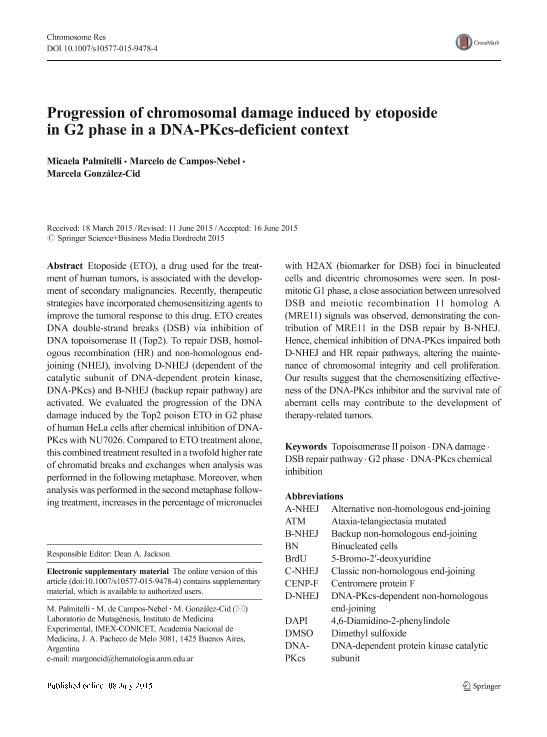Artículo
Progression of chromosomal damage induced by etoposide in G2 phase in a DNA-PKcs deficient context
Fecha de publicación:
12/2015
Editorial:
Springer
Revista:
Chromosome Research
ISSN:
0967-3849
e-ISSN:
1573-6849
Idioma:
Inglés
Tipo de recurso:
Artículo publicado
Clasificación temática:
Resumen
Etoposide (ETO), a drug used for the treatment of human tumors, is associated with the development of secondary malignancies. Recently, therapeutic strategies have incorporated chemosensitizing agents to improve the tumoral response to this drug. ETO creates DNA double strand breaks (DSB) via inhibition of DNA Topoisomerase II (Top2). To repair DSB, homologous recombination (HR) and non-homologous end-joining (NHEJ), involving D-NHEJ (dependent of DNA-PKcs) and B-NHEJ (backup repair pathway) are activated. We evaluated the progression of the DNA damage induced by the Top2 poison ETO in G2 HeLa human cells after chemical inhibition of DNA-PKcs. The inhibition by NU7026 together with ETO treatment resulted in a 2-fold higher rate of chromatid breaks and exchanges compared to ETO alone. Moreover, it was shown an increment in the percentage of micronuclei with H2AX positive signals in binucleated cells and a slight increase of dicentric chromosomes on second metaphases. It was also observed that in post-mitotic G1 phase, there is a closely association between unresolved DSB and MRE11 (Meiotic Recombination 11 homolog A) signals, demonstrating the contribution of MRE11 in the DSB repair by B-NHEJ. DNA-PKcs chemical inhibition impaired both D-NHEJ and HR repair pathways, altering the maintenance of chromosomal integrity and the cellular proliferative capacity. Thus, our results suggest that the chemosensitizing effectiveness of the DNA-PKcs inhibitor and the survival rate of aberrant cells may be determinants in the development of therapy-related tumors.
Palabras clave:
Topoisomerase Ii Poison
,
Dna Damage
,
Dsb Repair Pathway
,
G2 Phase
Archivos asociados
Licencia
Identificadores
Colecciones
Articulos(IMEX)
Articulos de INST.DE MEDICINA EXPERIMENTAL
Articulos de INST.DE MEDICINA EXPERIMENTAL
Citación
Palmitelli, Micaela; de Campos Nebel, Ildefonso Marcelo; Gonzalez Cid, Marcela Beatriz; Progression of chromosomal damage induced by etoposide in G2 phase in a DNA-PKcs deficient context; Springer; Chromosome Research; 23; 4; 12-2015; 719-732
Compartir
Altmétricas




